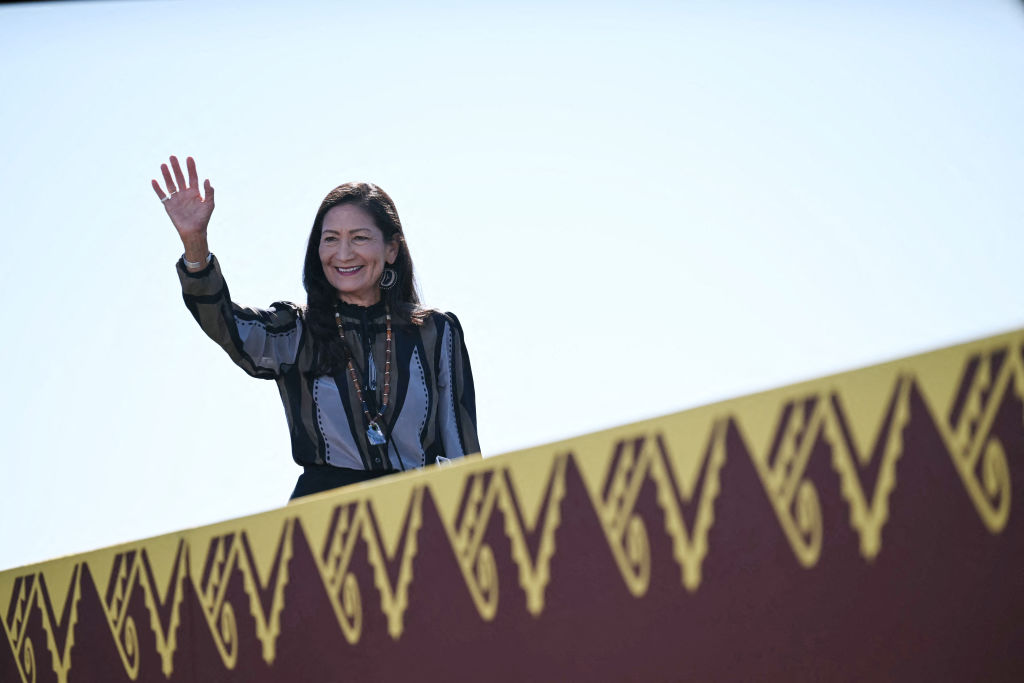With election day just a week away and the US presidential race effectively tied, Washington feels like it’s bracing for impact. But last Friday, on a bright and beautiful afternoon at the Gila River Indian Community in Arizona, there was a moment of great pride and hope for America.
US President Joe Biden did something no other president has done: he apologised to Native Americans for the systematic abuse endured by generations of indigenous children in boarding schools run by the federal government.
Biden is well-suited to offer a deeply felt apology. Israel’s actions in Gaza have left many angry about who Biden chooses to bestow his empathy on, but it’s undeniable that Biden’s willingness to publicly express compassion is unparalleled in modern presidential history. Former president Donald Trump is, of course, the polar opposite.
In the midst of global trepidation about a return of Trump, it’s possible to read Biden’s moment in Indian Country as a last gasp of moral leadership in America. However, that interpretation gives the president too much credit and indigenous peoples too little.
Biden’s apology comes 16 years after the Australian and Canadian governments issued formal apologies, and decades after New Zealand began to confront this issue.
A willing president is necessary for a formal apology, and Biden’s decision to appoint Deb Haaland, the first Native American Cabinet Secretary, was also a necessary step. But neither are sufficient. Haaland and her team at the Department of the Interior, along with the National Native American Boarding School Healing Coalition, created the conditions for the apology.
Following the 2021 discovery of the remains of 215 indigenous children in British Colombia, Haaland launched an investigation into the US Indian boarding school system. Her department produced, in two volumes, an accounting of the justification for the institutions, a description of the conditions the children experienced, and documentation of intergenerational effects.
Haaland, a citizen of the Pueblo of Laguna tribe and a 35th generation New Mexican, has personal experience with the trauma caused by the boarding schools. At the Gila River Indian community on Friday, an emotional Haaland explained that, “These boarding schools have impacted every single indigenous person that I know.”

The report includes findings from Haaland’s meetings with officials in Australia, New Zealand, and Canada, focused on learning the history of each country’s respective indigenous boarding schools and subsequent efforts at redress. How indigenous rights have been and are being claimed and negotiated differs significantly between the four British settler states. First Nations policies and recognition are generally less visible in the United States than they are in the other three nations. And Biden’s apology comes 16 years after the Australian and Canadian governments issued formal apologies, and decades after New Zealand began to confront this issue.
There is something distinctive about America’s historical inability to acknowledge a history of colonialism, and last Friday’s apology stands out as a rare moment of truth telling.
But the 574 federally recognised Native American tribes within the United States govern their own citizens and negotiate with the federal government on a nation-to-nation basis. Political self-determination has not guaranteed better outcomes for Native American peoples: unwinding the effects of four hundred years of colonisation is a long and complicated process. But protected sovereignty is solid foundation on which to build. Just last year (2023) the US Supreme Court—stacked with Trump appointees—protected tribal sovereignty in Haaland v. Brackeen.
Native American activists and policymakers will adapt as they always have and continue their work for justice.
Progress would be best served by Friday’s apology being followed by the implementation of the recommendations included in Secretary’s Haaland’s two-volume report, and further work to institutionalise Haaland’s elevation of indigenous knowledge on land stewardship and biodiversity protection within the US Department of the Interior.
But elections have consequences, and Trump is a wrecking ball. What is the trajectory for progress if Trump is once again at the head of the US government? The short answer is that efforts at Interior may stall, but Native American activists and policymakers will adapt as they always have and continue their work for justice.
There is also a more nuanced answer that involves trying to see the world with a greater sense of perspective, timewise, or with a perspective closer to that of First Nations peoples. The indigenous scholar-practitioner Sheryl Lightfoot has referred to the ongoing work to implement the 2007 UN Declaration on the Rights of Indigenous Peoples as a subtle revolution in which peoples perceived of as marginal actors are emerging with greater political power in the context of an international order in flux.
The increased visibility, understanding, and political pressure for the US government to tell the truth about the history of federal boarding schools is part of a larger story involving momentum among indigenous peoples globally. In their 2023 public engagement on indigenous diplomacy in Australia, the political philosophers Morgan Brigg and Mary Graham expressed something similar to Lightfoot’s subtle revolution. Brigg and Graham acknowledged the potential to advance indigenous forms of diplomacy in the context of contemporary foreign policy and to realise a more peaceful and relational future.
However, the path to get there involves “attention to glacial change” which is “appropriate from a perspective informed by ancient peoples,” but perhaps more difficult for other peoples.

